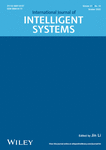PF-ITS: Intelligent traffic service recommendation based on DeepAFM model
Abstract
Due to the progressive complexity of traffic networks, the traffic pressure increases sharply and traffic accidents occur frequently, which is largely posed by imprecise traffic information service provided in existing Intelligent traffic service systems (ITSSs). To relieve traffic information trek encountered in complex traffic networks, the personalized traffic information recommendation based on click through rate (CTR) prediction has attracted extensive attention. However, the data sparsity and cold start problems in traditional recommendations hinder their real-time applications in ITSSs. In this paper, the multisource data with different types of context information are utilized to construct a personalized fine-grained recommendation method for intelligent traffic services (PF-ITS), which includes three components: a road condition optimization strategy (RCOS) to capture users' behavior preferences and traffic patterns, an encoder–decoder long short-term memory (LSTM) model to address the data sparsity and cold start problems with rich context information, and an improved DeepFM model based on attention mechanism (DeepAFM) to exert personalized fine-grained traffic information recommendation with embeddings of multisource data. More specifically, the RCOS is proposed to perform coarse-grained route recommendation based on path planning theory, in which the traffic data and drivers' preferences are fully utilized for comprehensive modeling. The encoder–decoder LSTM model is employed for representation learning, in which the traffic sequences and driving behaviors are mapped into dense distributed representations with rich semantic information. The DeepAFM is utilized to achieve effective driving safety guarantee according to an individual's requirements, in which the weighted low-order feature combinations and high-order feature interactions are incorporated for personalized fine-grained recommendation. We also conduct extensive experiments on public data sets and in real-world scenarios. The experimental results demonstrate that the PF-ITS method based on RCOS and DeepAFM outperforms the state-of-the-art baseline models in effectiveness and efficiency.
Open Research
DATA AVAILABILITY STATEMENT
The data analyzed in this study is subject to the following licenses/restrictions: The data that support the findings of this study are available from the corresponding author, Xueyu Che, upon reasonable requests. Requests to access these data sets should be directed to Xueyu Che by email: [email protected].




